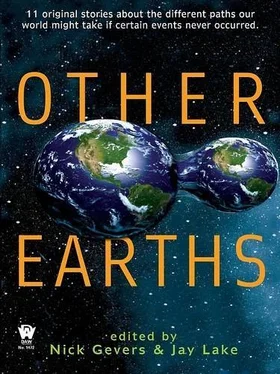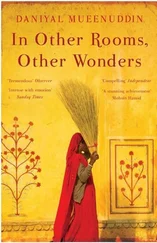Nick Gevers - Other Earths
Здесь есть возможность читать онлайн «Nick Gevers - Other Earths» весь текст электронной книги совершенно бесплатно (целиком полную версию без сокращений). В некоторых случаях можно слушать аудио, скачать через торрент в формате fb2 и присутствует краткое содержание. Жанр: Фантастика и фэнтези, на английском языке. Описание произведения, (предисловие) а так же отзывы посетителей доступны на портале библиотеки ЛибКат.
- Название:Other Earths
- Автор:
- Жанр:
- Год:неизвестен
- ISBN:нет данных
- Рейтинг книги:3 / 5. Голосов: 1
-
Избранное:Добавить в избранное
- Отзывы:
-
Ваша оценка:
- 60
- 1
- 2
- 3
- 4
- 5
Other Earths: краткое содержание, описание и аннотация
Предлагаем к чтению аннотацию, описание, краткое содержание или предисловие (зависит от того, что написал сам автор книги «Other Earths»). Если вы не нашли необходимую информацию о книге — напишите в комментариях, мы постараемся отыскать её.
Other Earths — читать онлайн бесплатно полную книгу (весь текст) целиком
Ниже представлен текст книги, разбитый по страницам. Система сохранения места последней прочитанной страницы, позволяет с удобством читать онлайн бесплатно книгу «Other Earths», без необходимости каждый раз заново искать на чём Вы остановились. Поставьте закладку, и сможете в любой момент перейти на страницу, на которой закончили чтение.
Интервал:
Закладка:
After five days Lucy tired of indulging me, of bringing me food, and coaxed me outside. I began taking walks around the immediate neighborhood, but I had no desire to explore farther afield. I had been to Phnom Penh twenty years before, and I had snapped pictures of the temples of Angkor Wat, skulls, the Killing Fields, crypts overgrown by the enormous roots of trees, and I had slept with expat girls and taxi girls, and I had partied heartily in this terrible place where death was a tourist attraction, getting kicked out of bars for fighting and out of one of the grand old colonial hotels along the river for public drunkenness. I needed no further experience of the country and was content to inhabit a few square blocks, reconciling myself to the idea that things had always changed around me, and how were you to distinguish between normal change and a change promulgated by a transition from one universe to the other? Did such a thing as normal change even exist? People, for example, were so predictable in their unpredictability. Amazing, how they could do a one-eighty on you at the drop of a hat, how their moods varied from moment to moment. Perhaps this was all due to physics, to universes like strips of rice paper blown by a breeze and touching each other, exchanging people and insects and corners of rooms for almost identical replicas; perhaps without this universal interaction people would be ultrareliable and their behavior would not defy analysis, and every relationship would be a model of logic and consistency, and peace could be negotiated, and problems, great and small alike, could be easily solved or would never have existed. Perhaps the breeze that blew the strips of rice paper together was the single consequential problem, and that problem was insoluble. I understood that what had panicked me was a fundamental condition of existence, one that a mistaken apprehension of consensus reality had caused me to overlook. I further understood that I could adapt to my recently altered perception of this condition and found consolation in the idea that I could train myself to be as blind as anyone.
Around the corner from the hotel was a restaurant that sold fruit shakes. A young girl tended it. She stood behind a table that supported a glass display case in which there were finger bananas, papayas and several fruits I could not identify, bottled milk and various sweeteners in plastic tubs. She spent much of her day cleaning up after a puppy that wandered among a forest of table legs, sniffing for food, pausing now and again to piss and shit—thus the fecal odor that undercut the sugary smell of the place. In the darkened interior were blue wooden chairs and tables draped in checkered plastic cloths and poster ads featuring Cambodian pop stars stapled to the walls. On the fourth day after I started going out, Lucy and I were having fruit shakes when the blonde girl from the hotel wandered in, clutching a large straw bag of the sort used for shopping. She sat against the back wall, staring out at the street, where a couple of moto cowboys were attempting wheelies, the brraaap of their engines overriding the restaurant’s radio. Lucy waved to her, but the blonde gave no reaction. Her skin was faintly luminous, like ghost skin, and her expression vacant.
“I’m going to see what’s wrong,” Lucy said.
“Nothing’s wrong,” I said. “She wants a shake.”
Lucy pitied me with a stare. “I’ll be back shortly.”
She joined the blonde at her table, and they spoke together in muted voices. With their heads together, one light and one dark, they posed a yin-yang juxtaposition, and as I sipped my shake, I thought about having them both, a fleeting thought that had no more weight than would the notion of taking a shot at Cate Blanchett. One of the moto cowboys pulled up facing the restaurant and shouted—he wore what looked to be a fishing hat with a turned-up brim, the word LOVE spelled out in beads on the crown, and he appeared to aim his shout at the blonde. She paid him no mind, busy conferring with Lucy. He shrugged, spoke to someone on the sidewalk I couldn’t see, and rode off. The puppy bumped into my foot. I nudged him aside and concentrated on sucking a piece of papaya through my straw. When I looked up, Lucy had taken the blonde by an elbow and was steering her toward our table.
“This is Riel,” Lucy said. “Riel, this is Thomas.”
Her eyes lowered, the blonde whispered, “Hi.”
“That’s an interesting name,” I said. “It’s spelled the same as the currency?”
The question perplexed her, and I said, “Cambodian money. The riel? Is it spelled the same?”
“I guess.” At Lucy’s prompting, she took a seat. “It’s French. Like Louis Riel.”
“Who?” I asked.
“A famous Canadian. The Father of Manitoba.”
“I didn’t know Manitoba had a father,” said Lucy pertly.
“Tell me about him,” I said.
“People say he was a madman,” Riel said. “He prayed obsessively. They hanged him for treason.”
“And yet he fathered Manitoba.” Lucy grinned.
“Mitch says they must have named the money over here for him, too,” Riel said.
The counter girl, who had ignored her to this point, came over and asked if she wanted something.
“Make her a banana shake,” Lucy said, surprising me that she would know what Riel wanted.
I asked Riel if she was from Manitoba, and she said, “Yes. Winnipeg.” Then she asked Lucy if she could have custard apple instead of banana.
I inquired as to who Mitch was, and Lucy said, “The ass who was with her. He ran off with their money. I told her she should stay with us until she figures out what to do.”
This snatch of conversation summed Riel up—she saw her beauty as a type of currency and was, perhaps, mad—and summed up our relationship with her as well. It seemed Lucy had found someone more submissive than she herself was. She sent messages with her eyes saying that she wanted this to happen.
“Yeah, sure,” I said.
Riel greedily drank her shake, eschewing a straw. She was, if you overlooked her drug abuse, a sublime creature possessed by a serene absence.
Once she finished her shake, Lucy went off with her, saying that they were going to “get something” for Riel. I went back to the hotel and read and stared out the window. The sky was almost cloudless, a few puffs drifting high, but then it flickered, the entire blue expanse appearing to wink out, like a television image undergoing a momentary loss of power, and a large cloud roughly resembling a canoe appeared in the lower sky; the roofline above which it floated also seemed different, though I couldn’t have told you how. But the canoe-shaped cloud …I was certain it had not been there seconds before. I expected another flicker, and when none came, I was relieved; and yet I felt again that that summoning toward the south. A longing pervaded me, a desire to be on the move, and that longing intensified, faded, intensified …It was as if, having risen to the bait of The Tea Forest, something was tugging gently on the line, trying to set the hook deep before reeling me in.
After an hour the women returned and went into the bathroom, where they remained for twenty-five minutes. When they emerged, Riel was topless and wobbly. A trickle of blood ran down her arm—it might have been a scarlet accessory designed to contrast with her milky skin. With an arm about her waist, Lucy helped her to lie on the bed next to ours, cleaned away the blood, and wrangled off her jeans. Riel fell into a light sleep. Lucy started to disrobe.
“What was all that in the bathroom?” I asked, putting down my book.
“She had trouble getting a vein.” Lucy skinned out of her panties. “I assisted.”
“And now?”
She put a finger to her lips and stretched out beside Riel and began to caress her. This male fantasy held no particular appeal for me in the abstract, yet now I was captivated by Lucy’s tenderness and thoroughness. She left no area of Riel’s skin unexplored, licking and rubbing against her with the delicacy of a cat. The bed played an oriental music of squeaks and sproings when she went down on her, a lengthy symphony with prolonged, hushed spaces between the notes, reflecting discrete movements of Lucy’s fingers and tongue. They achieved a simultaneous climax, Lucy digging between her own legs with her left hand, letting forth a gasp, and Riel, becoming active at the end, crying out while holding Lucy’s head in place.
Читать дальшеИнтервал:
Закладка:
Похожие книги на «Other Earths»
Представляем Вашему вниманию похожие книги на «Other Earths» списком для выбора. Мы отобрали схожую по названию и смыслу литературу в надежде предоставить читателям больше вариантов отыскать новые, интересные, ещё непрочитанные произведения.
Обсуждение, отзывы о книге «Other Earths» и просто собственные мнения читателей. Оставьте ваши комментарии, напишите, что Вы думаете о произведении, его смысле или главных героях. Укажите что конкретно понравилось, а что нет, и почему Вы так считаете.












